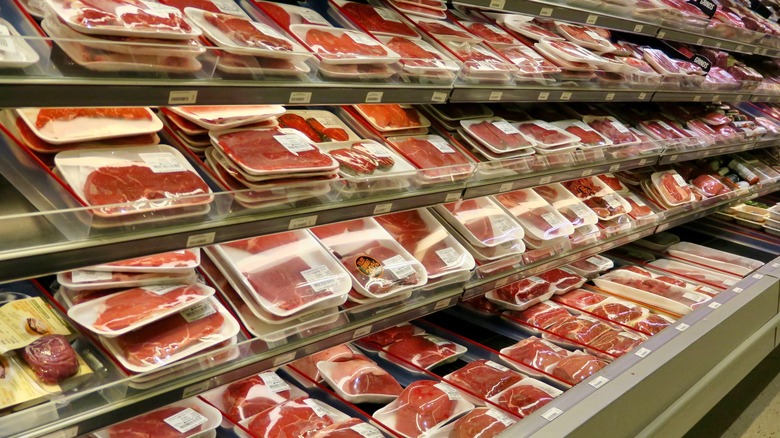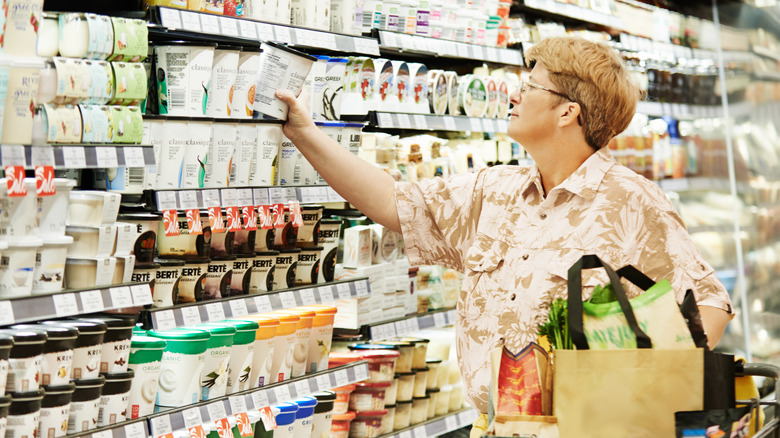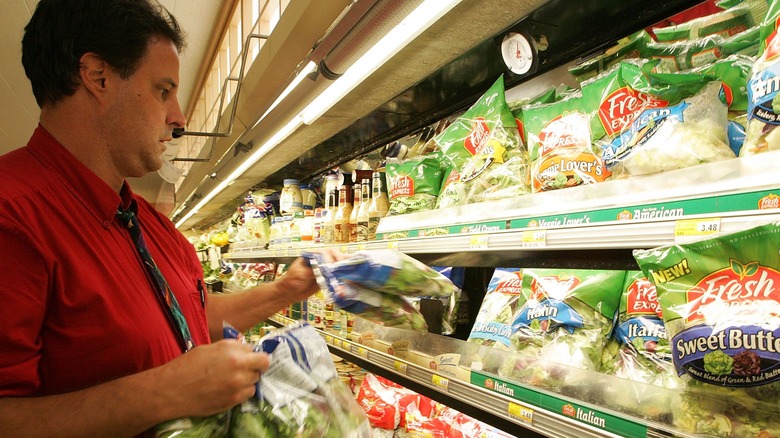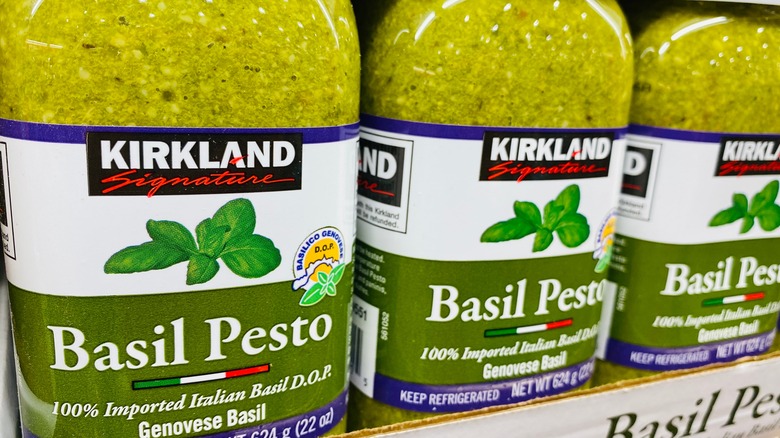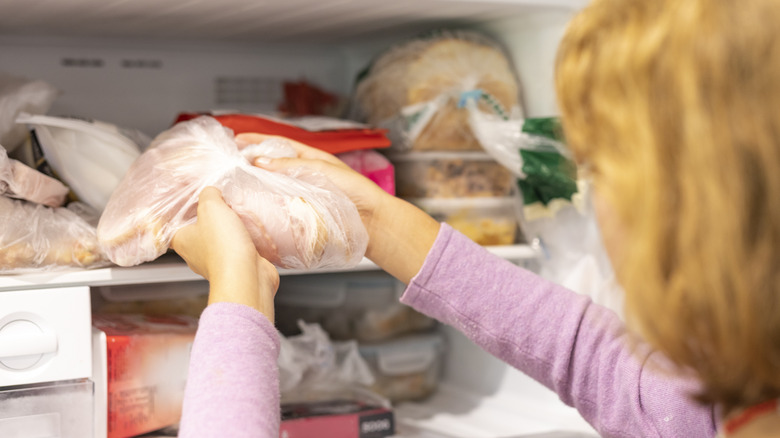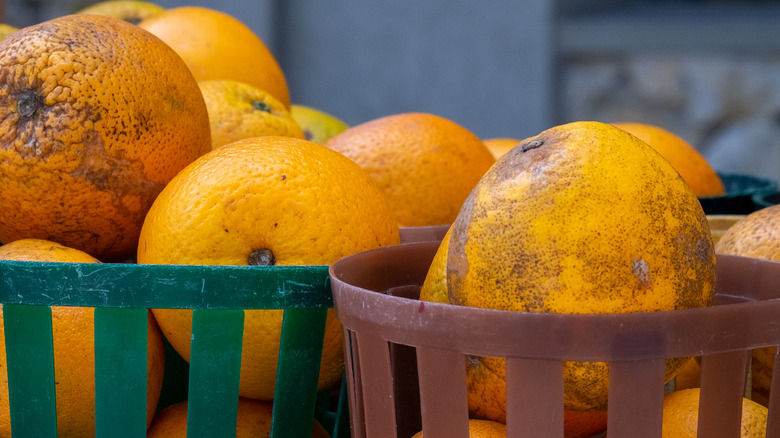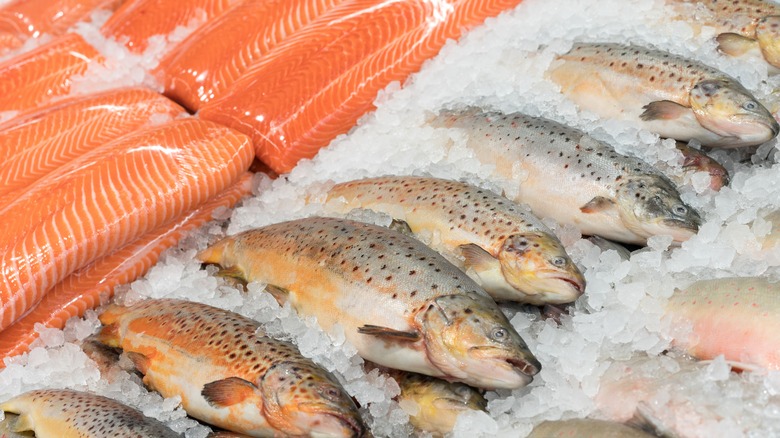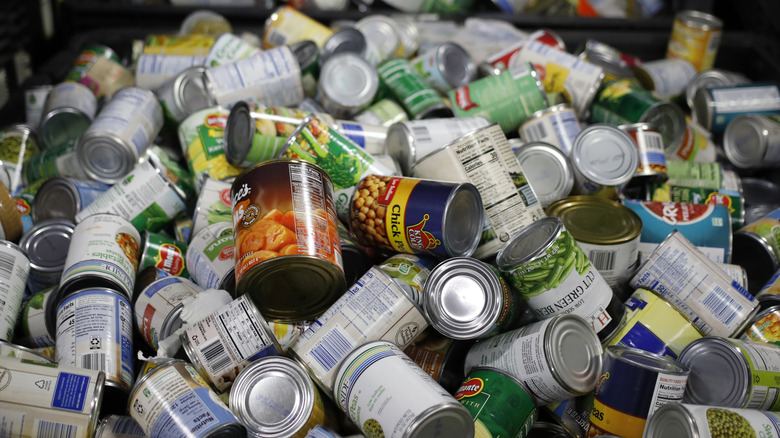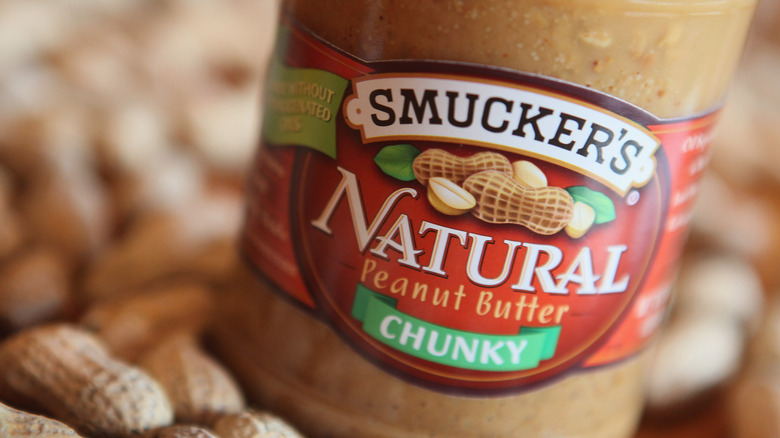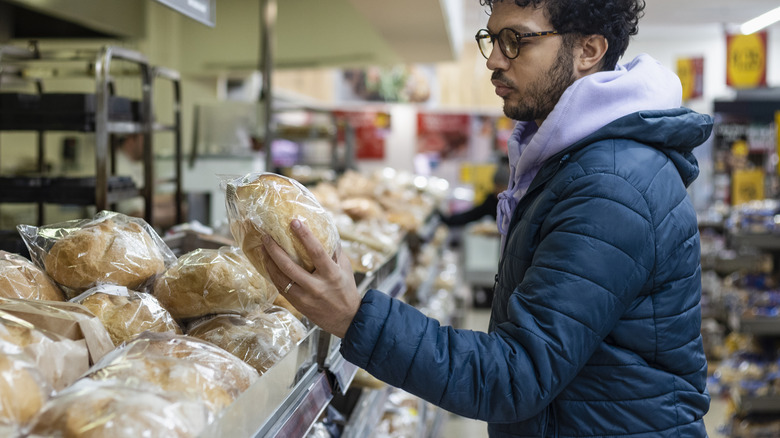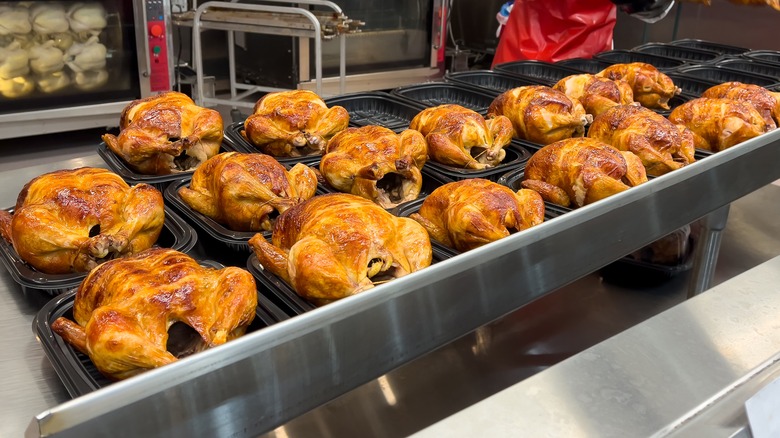You Might Want To Skip These Grocery Store Items When They're On Sale
There's something about getting a good deal on items you buy at the grocery store. After all, it's becoming more difficult to lower the food bill between supply shortages and inflation causing prices of everyday items to soar. We're big fans of sales around here, especially when it comes to saving money on necessities like food.
Stores know how to catch the attention of customers with a flashy sale sign and attractive price tag. However, savvy shoppers know the difference between a sale and an actual good deal. If you don't quite consider yourself a savvy shopper, that's okay — this guide is for you.
The next time you walk the aisles of the grocery store, keep in mind that only some sales are good deals, especially when it comes to food. Some foods are less likely to go on sale unless they're close to expiring, which is something you'll want to avoid if you can't use the food before the expiration date. The last thing you want is to have the food you buy go to waste. Consider this list of potential on-sale grocery items that you might want to skip buying on your shopping trips.
Soon-to-expire meat
The price of meat has been on the rise for a while now, and it doesn't look like it has any plans to slow down soon. Kelly Schmidt, the CEO of Minnesota Beef Council, tells CBS News that the shortened meat supply causing price increases is largely due to "weather conditions, drought conditions that have happened in the last number of years. Really when there's not enough resources, pasture, hay, or feed, you're going to see the cattle supply change." It's not surprising that shoppers seek ways to save money, especially when it comes to beef, pork, and chicken.
Grocery stores sometimes put meat on sale when there's an overage. In other words, shoppers aren't buying as much as the store projected for that day or week. It's better for the store to sell the meat for at least some money than for none at all. However, you should be cautious about buying meat on sale because it could be close to its expiration date. Fresh, packaged meat at the store typically has a sell-by date, which indicates when the store needs to sell the meat. Shoppers generally should use that meat within one to three days of that date. Otherwise, the meat may move past its expiration date into unsafe-to-eat territory.
If you don't think you can use the meat that quickly after buying it, it's best to steer clear of the on-sale meat packages and buy some at regular prices. Safety comes before all else — especially concerning the safety of meat.
Pastries or donuts
If the grocery store you frequent makes and sells its own baked goods or has fresh supplies of pastries and donuts hitting the shelves several times per week, you may have seen some of those freshly-baked goods go on sale. Usually, bakery departments have a separate area of the bakery for everything that's marked down for the day, from boxes of donuts to cakes, brownies, and other sweet treats. Pastries and donuts, especially, have short shelf lives, so a bakery might place items with overages on sale to get rid of some of the supply quickly. These are typically referred to as day-old items because they were likely made the day before you buy them.
However, if you do grab any of these items because you can't pass up the price, you might be disappointed in their quality. Although some day-old bakery items satisfy the sweet tooth, others might lean on the stale side. Unfortunately, you never know what you're going to end up with unless you bite into it. If you're not one to play roulette with the freshness of your baked goods, you should probably skip the sale rack — no matter how sweet the deal.
Milk or milk-based products nearing their sell-by date
Milk and many milk-based products are known for their relatively short shelf life. That's because milk naturally contains bacteria that can quickly multiply — even if the milk has gone through processing to control some of that bacteria (pasteurization). This is especially true if milk isn't stored properly, such as leaving it on the counter for a couple of hours after using it or forgetting to put the cap back on after pouring some into a glass.
Therefore, milk's use-by date is a pretty important one to follow. Although you might get the occasional gallon that smells or looks okay for a couple of days past its use-by date, it's still a good idea to toss it after this date to avoid taking chances with quality or safety.
When you see milk on sale at the grocery store, there's a chance that it's very close to the use-by date, and you may only have a day or two to use it. The same goes for milk-based products, like cottage cheese and yogurt. Always check the use-by date on dairy products for sale to gauge whether you have enough time to use them. It might even be cheaper to buy a half gallon of milk or a smaller tub of yogurt if that's all you think you'll need before you get groceries again.
Bagged or premade salads
There's no doubt about it: Premade and bagged salads are convenient to buy and use when you need quick lunches or side dishes for meals. However, the safety of these grocery items has been called into question multiple times over the past several years, as they've been involved in recalls for harmful bacteria outbreaks that make people ill, such as E. coli and Listeria monocytogenes. A 2021 study published in Foods found that the number of microorganisms naturally living on prepackaged salads increases near the end of their shelf life, which is indicated by their expiration date. Therefore, prepackaged salads that are marked down because they're expiring within the next day or two might be best to avoid if you don't think you're going to use them in time.
On another note, although the price for on-sale salads might seem enticing, there's a good chance you can save even more money by making a salad yourself. Typically, you can make multiple salads out of the ingredients you buy separately, potentially for about the same price you'd pay for one prepackaged salad. Just be sure not to overbuy produce to avoid food and money waste.
Bulk items you won't use
We can admit that it's tough to walk down the aisles of a grocery store and pass up items in bulk that are priced more affordably than their smaller versions. Say, for example, a 60-ounce juice is $6, but a 20-ounce juice is $4. You're saving quite a bit of money per ounce if you buy the larger version. If the bulk item is on sale, it might be even more enticing to buy.
The problem with bulk items is that you may not use them all before they expire. According to researcher Victoria Ligon of the University of Arizona, people typically shop in bulk to gather enough items for meals weeks in advance (via Slate). They're attracted to the seemingly low pricing and convenience of having more food on hand. Add a sale to some of those bulk items, and they can be hard to pass up. But, Ligon also says that an overbuying mentality leads to a lot of food waste, as buyers might end up with more food than they can reasonably use.
In other words, that $6 bulk container of juice might seem like an awesome deal when it's on sale for $5. But, if you only end up drinking about one-third of it before its expiration date, you still waste money and juice. Meanwhile, you could've avoided both by buying the 20-ounce container for $4.
Items in large packaging you don't have space for
Speaking of bulk items, there's another reason you might want to be careful of buying up a bunch of them on sale. Bulk items come in larger packages to accommodate the larger portion of what's inside. Meat might come in oversized freezer bags or large plastic-wrapped trays while condiments and sauces are available in hefty jars or plastic tubs.
Again, sale prices on bulk items can cause you to want to buy them, especially if you're relatively sure you use enough of the product to finish it before its expiration date. However, larger containers can be extremely difficult to store properly without a commercial-sized pantry, refrigerator, or freezer. As you may know, storing food correctly is a crucial part of ensuring that it remains safe to eat. Several items, once opened, need to be stored in the refrigerator, which can be challenging for a large tub of mayo or a massive tray of prepared fruit and cheese.
Some produce, like leafy greens, can be stored in the freezer in an airtight container if you have more than you need for the next few days. You can also store extra meat in freezer-safe bags. However, buying too many on-sale bulk items at one time might leave you with not enough refrigerator or freezer space to store everything properly. It's important not to overcrowd either one, as your food needs enough space between to allow air to circulate properly.
Frozen food that shows signs of refreezing
Does your grocery store have several frozen items on sale for much lower prices than usual? Be careful about buying them until you've fully inspected the items you want to add to your cart. Stores need to make room for new items, especially in areas with limited space, like the freezer aisles. To do that, they remove older products nearing their expiration or items they're replacing with something different. To help get rid of older inventory, the store may put those items on sale.
However, inexperienced workers may not store the older items properly while they rotate and restock, which could be a big problem for frozen food, especially. Once-frozen food could be left out for a while until it finds its new home in the freezer's sale section. This can lead to quicker spoilage and bacteria growth.
Before buying those on-sale products, look for ice crystals forming on the packaging or food, also known as freezer burn. This is a tell-tale sign that the food has thawed at least partially and been refrozen, which can decrease its quality and safety.
Soft or bruised produce
One of the most common places to find sales in the grocery store is in the produce section, and we love a good deal on fresh fruits and vegetables. It's relatively common for overstocked product items to go on sale — even when they're at peak quality, so customers buy them rather than stores letting them spoil on the shelf.
But it's also common for stores to mark down prices on produce that is on its way to the trash soon as it nears its expiration. Unfortunately, not all stores explain why certain produce is on sale, so it's up to you to do some detective work before you buy anything. The most important thing to look for is whether the produce is soft or bruised. Some stores are highly selective in the produce they put front and center for customers while others end up on a sale rack featuring items of lower quality that may be bumped, bruised, and soft. Although these aren't indicators that produce is unsafe to eat, these problems could affect the overall flavor and texture you expect from them. Additionally, soft or bruised spots can speed up the browning process, which may cause them to overripen and no longer be usable to your standards.
Fresh seafood that smells fishy
Sales of fresh fish at your local supermarket can be quite a catch, as fish is typically one of the more expensive items to buy on your grocery list. It's exciting to see $2 off tags or a per-pound discount on freshly caught salmon, tuna, halibut, scallops, and other tasty seafood. But what about when a store marks down its seafood simply because it's close to expiring?
That could be the case, so it's a good idea to know what to look for when seafood isn't its freshest. Although the packaging and sell-by dates are your number-one indicators of freshness, they don't always reveal the full story of seafood on sale. Instead, you should rely on your nose to paint a full picture. Commercial fisherman Tony Maltese tells CNBC that a strong, fishy smell is actually a sign that seafood is past its prime. "If you smell fish, leave," Maltese explains. "Don't buy any fish there." Although a sale on fish can be difficult to walk away from, it might be best if the marked-down fish has a strong odor.
Dented or damaged canned goods
If you spot a section of canned fruits, vegetables, meats, or other foods on sale, be sure to inspect the cans thoroughly because they might be marked down for a reason. Some stores put canned items on sale when they're lower quality than what belongs on the shelves, such as cans with ripped labels or dents.
Although the look of a canned item doesn't always say anything about what's inside, it could. Swollen cans should absolutely be avoided, as swelling indicates a buildup of hydrogen gas within the can. This can cause the food to spoil chemically, rendering it unsafe to eat (often thanks to deadly botulism).
Denting isn't always as dangerous, but it can be. Small dents are usually not cause for alarm, but you should probably skip buying on-sale cans with large dents that can accommodate the tip of your finger. That's because larger dents may interfere with the integrity of the can, potentially allowing small cracks or punctures to form that give bacteria room to make their way into what's inside.
Natural nut butters
Natural nut butter — the kind without preservatives and processed ingredients — is typically more expensive than processed versions, so it's natural to want to find it on sale. If you use nut butter frequently and can use up a jar within a couple of weeks, then buying natural nut butter on sale to save a few dollars might be worth it. However, it's important to remember that natural nut butter tends to have a much shorter shelf life than processed versions because of its lack of preservatives.
If you are going to stock up on the sales, be sure only to buy what you can use within the next few months, and those jars should remain closed until you're ready to use them. Otherwise, natural nut butters are usually only good for about one month in the pantry once you open them. You can usually squeeze out a little longer if you store them in the refrigerator after you've popped the lid, but be aware that refrigerating natural nut butter can make them even more difficult to stir than they already are.
Bread, if you prefer fresher slices
If you see lots of bread on sale at the grocery store, there's a good chance the bread was overstocked, and the store wants to sell it fast, leading to a bunch of $1 off stickers in the bread aisle. That could be great for you if the sell-by dates are still a few days away, or you have some space in the freezer to put a few extra loaves.
However, sometimes bread is placed on sale when it's made fresh in the bakery the day before, and now the store wants to make room for fresher inventory for the day. If you plan to use your on-sale bread for making croutons, stuffing, or breading, stale bread can be an excellent buy. But, if you're looking for the freshest bread for your money, you might be disappointed in what you buy on sale. Day-old bread can sometimes lean a little more on the stale side.
We know that passing up a deal is tough, so here's a trick if your bread ends up a little crispier than you bargained for. Dampen a paper towel, and wrap it around your bread slices. Then, microwave the bread for about 10 seconds to soften it.
Prepared foods, especially if they're in a different storage area than usual
Not much beats the convenience of buying prepared food at your local grocery store — whether you want cold pasta salads for a party or need some hot rotisserie chicken for dinner. Not much, that is, unless you find those same delicious foods on sale, so you can benefit from both convenience and savings.
However, be mindful that some of that prepared food might be on sale because it's not as fresh as non-sale items. If that's the case, you'll need to use it up more quickly, so look for sell-by dates to ensure they're not too close to creeping up on their expiration. It's also important to pay attention to how the sale items are stored. If they're right by all the freshly prepared items being stored properly at the right temperatures, there shouldn't be an issue. But if they're set aside in a sale area that doesn't look like it has the same holding standards, you might want to reconsider buying it. Prepared food not stored at the proper temperature for as little as two hours can grow harmful levels of bacteria.
Another point to consider: That on-sale prepared food might still be more affordable to make yourself. If saving money is your number-one priority, think about whether the convenience of buying prepared food outweighs the potential cost benefits of making your own.

